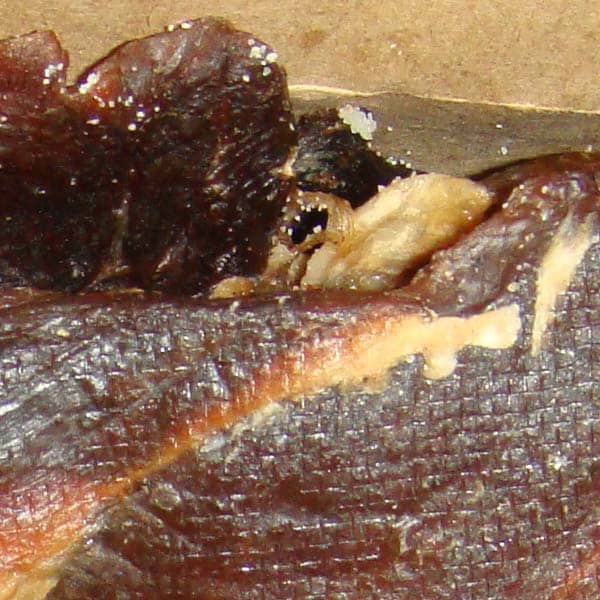How Long Can Beef Jerky Be Stored for

When it comes to long-term storage, jerky is one of the trickiest foods. The shelf life of jerky can vary drastically depending on factors like the type of meat used, moisture levels, pretreatment methods, additives and storage methods.
If you want to store jerky long-term, here is what you need to know.
Does Beef Jerky Go Bad?
Yes, jerky can go bad. If the beef jerky gets too moist, mold growth can occur. The fats in jerky will go rancid over time, especially in high temperatures. In some cases, bacteria can grow on jerky and cause food poisoning.
Shelf Life of Jerky
Store-bought jerky typically contains preservatives and usually will last at least a year without any special storage. By contrast, homemade jerky may only last a few weeks before it starts to go bad. However, even homemade jerky can last for over a year if stored properly.
Jerky Long-Term Storage Methods
Below are the best methods for storing jerky long-term. For more detail, read this How Long Does Dehydrated Food Last?.
1. Airtight Container with Oxygen Absorbers
When stored in an airtight container like a Mylar bag with an oxygen absorber, homemade jerky can last for over 12 months. The airtight container ensures that moisture doesn't reabsorb into the jerky and the oxygen absorber inhibits microbial growth and rancidity.
Read:
- Instructions for storing food in Mylar bags
- How to use oxygen absorbers for food storage
2. Freezer
If your jerky is very moist or you don't have anywhere cool to keep it, then the freezer is the best storage method.
Jerky will last indefinitely in the freezer.
There is no need to use oxygen absorbers when storing in the freezer but you do want to make sure it is in airtight packaging. Otherwise, it could absorb bad smells from the freezer.
3. Refrigerator
Heat will make the fats in jerky go bad fairly quickly. So, storing jerky in the refrigerator is a good idea if you live somewhere warm.
Homemade jerky will typically last 4 months in the fridge. However, moisture levels in the fridge can actually be very high. To keep this moisture from getting into the jerky and causing spoilage, the jerky should be kept in airtight containers. Put a desiccant in the container to help control moisture.
4. Vacuum Sealing
Homemade jerky will last 1-2 months if vacuum sealed. Commercial jerky in vacuum-sealed packaging will usually last 12+ months.
Vacuum sealing isn't a good option for long-term storage in humid climates though because the containers will eventually allow air through.
It is better to use containers that are truly airtight, such as mason jars or Mylar bags.
Read: Vacuum Sealing vs. Mylar Bags for Food Storage
How to Make Homemade Jerky Last Years
In addition to the storage methods, the way you make jerky will affect the shelf life. If you are making jerky with the intention of storing it long-term, then follow these guidelines.
- Choose beef or lamb: The fatty acids in poultry and pork go rancid faster than those in beef or lamb. I couldn't find info on where deer or wild game meat falls in terms of jerk shelf life.
- Only use very lean meat: Fat will start to go rancid fairly quickly, so you should only use very lean cuts of meat for making jerky which you want to store for a long time.
- Pretreat the meat: It is good practice to pretreat meat before making jerky anyway, but it is absolutely necessary if you want to store it long-term. The easiest treatment method is to boil meat in the marinade before dehydrating.
- Use acids: The jerky recipe should include an acid-like vinegar. This improves shelf life by inhibiting microbe growth.
- Cut into very thin, uniform slices: This helps ensure that no moisture pockets are left in the dried meat.
- Dehydrate until VERY dry: It should be so dry that the jerky snaps easily when bent. Any moisture left inside can support mold growth!
Also read:
- Best Dehydrators for Jerky
How to Tell If Jerky Is Bad?
When jerky goes bad, it is usually because of mold growth or because the fats have gone rancid. Moldy jerky will have fuzz on it. Rancid jerky will get a gross sour smell and taste. If the jerky looks off or has any strange odors or tastes, don't risk it – throw it away.
Note that jerky will change in appearance over time. It is natural for the salts and fats in jerky to migrate outwards. This creates a whitish layer on the exterior which may look like mold even though the jerky is still safe to eat.

Not sure if jerky is bad? Use these guidelines:
- Salt: The white film will look like crystals. It will usually create an even film on the jerky and not have a web-like appearance.
- Fats: Fat deposits will be shiny and easily wipe away.
- Mold: Mold on jerky is fuzzy and has a web-like appearance.
Source: https://www.primalsurvivor.net/jerky-storage/
0 Response to "How Long Can Beef Jerky Be Stored for"
Post a Comment